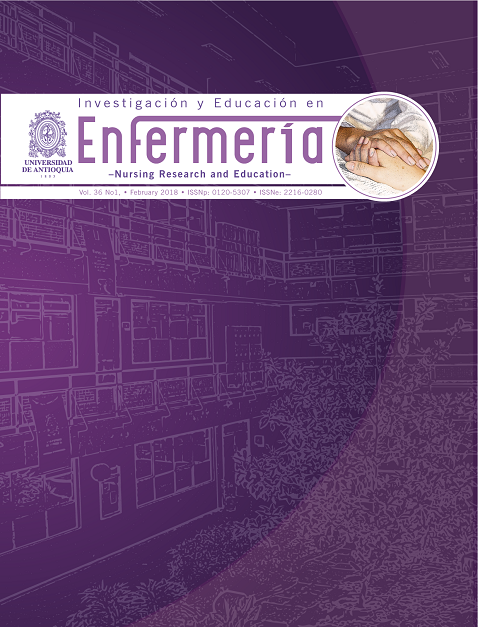Promotion and Enhancement of Knowledge in Nursing
DOI:
https://doi.org/10.17533/udea.iee.v36n1e01Abstract
Abstract:
Knowledge is the product of the action of learning and has as requisite that it can be expressed and communicated to others.(1) According to Fawcett,(2) one of the central issues for the survival of nursing as a discipline is understanding the nature and structure of nursing knowledge. This can be interpreted as the clarity about that which should be investigated, what should be done in the practice, and what should be taught during the formation of professionals. Although research, practice, and formation have been based on the body of knowledge from other disciplines,(3) it is not possible to achieve autonomy and independence in practice, as a given right,(4) if progress is not made in the construction, consolidation, and appropriation of nursing’s own knowledge. Hence, to promote the development of nursing knowledge requires three central elements: formation, practice, and research; and each of them transversed by other support elements, like the development and analysis of concepts, the use of medium-range theories, the use of a standardized language, and evidence-based nursing.
Downloads
References
(1) Durán MM. Enfermería. Desarrollo teórico e investigativo [Internet]. Bogotá: Universidad Nacional de Colombia; [cited 18 Feb 2018]. Available from: http://www.uneditorial.net/uflip/Enfermeria-Desarrollo-Teorico-eInvestigativo/pubData/source/Enfermeria-desarrollo-teorico-e-investigativo.pdf
(2) Butts JB, Rich KL, Fawcett J. The Future of Nursing: How Important is Discipline-Specific Knowledge? A Conversation with Jacqueline Fawcett. Nurs. Sci. Q. 2012; 25(2):151–4.
(3) Durán MM. Teoría de enfermería ¿un camino de herradura? Aquichan. 2007; 7(2):161–73.
(4) Tapp D, Stansfield K, Stewart J. La autonomía en la práctica de enfermería. Aquichán. 2005; 5(1):114–27.
(5) Moreno ME. Metodologías para la aplicación del conocimiento teórico de enfermería. Aquichan. 2012; 12(2):95–6.
(6) Seguel-Palma FA, Valenzuela-Suazo S, Sanhueza-Alvarado O. Corriente epistemológica positivista y su influencia en la generación del conocimiento en enfermería. Aquichan. 2012; 12(2):160–8.
(7) González J. Application of nursing diagnoses in the field of occupational health. Examples of nurse prescribing. Med. Segur. Trab. 2010; 56(221):328–46.
(8) Silva NCM, Oliveira ARS, Carvalho EC. Knowledge produced from the outcomes of the “Nursing Outcomes Classification - NOC”: integrative review. Rev. Gaúcha Enferm. 2015; 36(4):104–11.
(9) Weir-Hughes D. Valuing the knowledge of nursing: naming it and making it visible. J. Clin. Nurs. 2016; 25(13–:1787–8.
(10) Ramírez NA, Quintana MO, Sanhueza O, Valenzuela SV. El paradigma emancipatorio y su influencia sobre el desarrollo del conocimiento en Enfermería. Enferm. Glob. 2013; 30:410–21.
(11) Durán MM. La renovación del conocimiento y la práctica. Aquichan. 2014; 14(1):5–6.
(12) Alcolea MT, Oter C, Martín Á. Enfermería Basada en la Evidencia. Orígenes y fundamentos para una práctica enfermera basada en la evidencia. NURE Investig. 2011; 52:1–7.
(13) Fawcett J. On bed baths and conceptual models of nursing. J. Adv. Nurs. 2003; 44(3):229–30.
(14) de la Cuesta C. La investigación cualitativa y el desarrollo del conocimiento en enfermería. Texto Contexto-Enferm. ; 19(4):762–6.
(15) Vanegas BC. La investigación cualitativa: un importante abordaje del conocimiento para enfermería. Rev. Colomb. Enferm. 2011; 6(6):128–42.
(16) Fawcett J. Using the Roy Adaptation Model to Guide Research and / or Practice: Construction of ConceptualTheoretical-Empirical Systems of Knowmledge. Aquichan. 2009; 9(3):297–306.
(17) Fawcett J. Contemporary Nursing Knowledge. Davis Company; 2005.
(18) Meleis AI. Theoretical Nursing. Development & Progress. 5th Ed. Wloters Kluwer; 2012.
(19) Walker L, Avant K. Strategies for Theory Construction in Nursing. Prentice Hall; 2011.
(20) Palese A, Coletti S, Dante A. Publication efficiency among the higher impact factor nursing journals in 2009: A retrospective analysis. Int. J. Nurs. Stud. 2013; 50(4):543–51.
(21) Arzuaga MA, Correa AH, Florez-Torres IE. Production of knowledge in the master’s program in collective health of the faculty of nursing at Universidad de Antioquia, 1996-2013. Invest. Educ. Enferm. 2015; 33(2):206–16.
(22) López-Torres Hidalgo J, Basora Gallisà J, Orozco Beltrán D, Bellón Saameño JÁ. Mapa bibliométrico de la investigación realizada en atención primaria en España durante el periodo 2008-2012. Aten. Prim. 2014; (10):541–8.
(23) Fawcett J. Tendencias de Investigación en Enfermería. Aquichan. 2014; 14(3):289–93.
(24) Avena MJ, Barbosa DA. La producción del conocimiento y las estrategias para incorporación de los resultados a la práctica de enfermería. Rev. Gauch. Enferm. 2016; 37(esp):e71866):12–3.
(25) Congreso de la República de Colombia. Ley 266 de 1996 Por la cual se reglamenta la profesión de Enfermería en Colombia y se dictan otras disposiciones. Diario Oficial 42.710; 1996.
Downloads
Published
How to Cite
Issue
Section
License
Derechos de propiedad / Direitos de Propriedade
English: If the article is accepted for publication, all copyright will be of exclusive property of Investigación y Educación en Enfermería. The text and the graphics included in the publication are exclusive responsibility of the authors and not necessarily reflect the thought of the Editorial Committee.
Español: Si el artículo es aprobado para publicación, todos los derechos son de propiedad de Investigación y Educación en Enfermería. El texto y las gráficas incluidas en la publicación son de exclusiva responsabilidad de los autores y no necesariamente refleja el pensamiento del Comité Editorial.
Português: Se o artigo for aceito para publicação, todos os direitos autorais serão de propriedade exclusiva de Investigación y Educación en Enfermería. O texto e os gráficos incluídos na publicação são de responsabilidade exclusiva dos autores e não refletem necessariamente o pensamento do Comitê Editorial.















